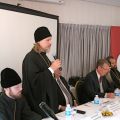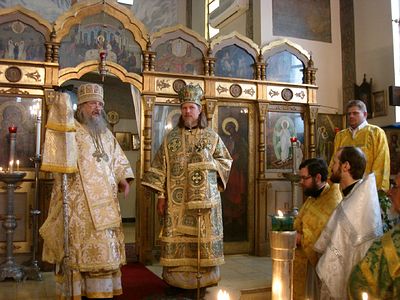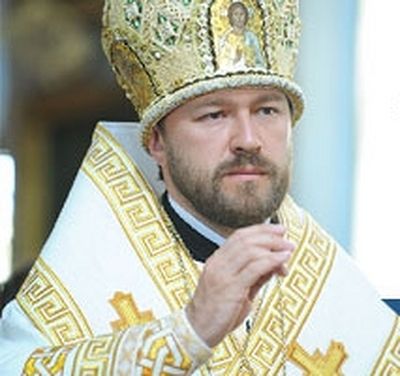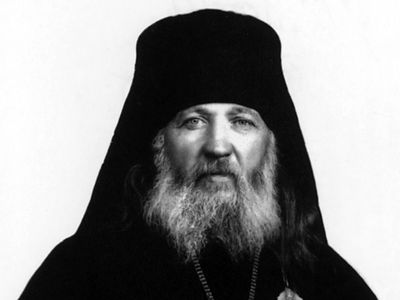Buenos Aires, August 24, 2010

Clergymen and laypersons from the following countries participated: Argentina, Brazil, Bolivia, Venezuela, Colombia, Costa Rica, Cuba, Mexico, Panama, Paraguay and Ecuador. Heading the round table was His Eminence Archbishop Mark of Yegorievsk, Head of the Moscow Patriarchate’s Administration of Institutions Abroad; His Grace Bishop John of Caracas and South America; Igumen Philip (Ryabykh), Vice President of the Department of Church External Relations; Igumen Pavel (Khokhlov), Secretary of the South American Diocese of the Moscow Patriarchate; Mr. AV Chepurin, Director of the Russian Ministry of Foreign Affairs’ Office of Cooperation with Compatriots Abroad, and Mr. IV Romanchenko, Acting Plenipotentiary of the Russian Federation in Argentina.
In his keynote address, Archbishop Mark relayed a greeting sent by His Holiness Patriarch Kirill of Moscow and All Russia to the participants of the round table. Vladyka noted the importance of this meeting, to which people from various corners of the region came for the first time with the goal of discussing ways of preserving Russian spiritual traditions in Latin America.
Mr Chepurin read a welcoming message from the Minister of Foreign Affairs of the Russian Federation, Sergey Lavrov.
The floor was then given to Vladyka John. In his speech, the Ruling Bishop of the South American Diocese of the Russian Orthodox Church Outside of Russia told of a new phase in the life of the Russian diaspora. He stressed that now we must work together to support the Russian Church in South America, which is undergoing difficult times.
Fr Philip read the greeting from His Eminence Metropolitan Ilarion, the Head of the DECR, after which he expressed his own thoughts regarding the work of the round table: “Such measures have already been established as a good tradition. They are truly beneficial, because sometimes, due to great distances, the clergymen and laity who work in the various countries of Latin America have practically no way of meeting. In connection with this I would like to thank the Ministry of Foreign Affairs of Russia for organizing this event. I would like to announce that cooperation between the Russian Church and the Ministry has established a solid legal foundation, since the Federal Assembly of Russia adopted a Federal law on making amendments to the ‘Law on Compatriots.’ In particular, it envisions government cooperation in ensuring the legal right to establish religious organizations for our compatriots abroad and their socially meaningful initiatives.”
The participants of the round table shared their experiences in pastoral services in their countries, the realization of educational projects, social and exhibition work on the parish level. Some of the delegates presented slide shows and visual aids.
Mr Zabolotsky of Brazil talked about the celebration of the 100th anniversary of the Russian emigration in Rio Grande do Sul and the book he published to mark the event. He expressed his opinion on how best to preserve the bonds between Russian abroad and the Homeland. “It is specifically the Orthodox church that is the center of our lives abroad,” said Mr Zabolotsky. The Brazilian delegate noted sadly that South America is home to many compatriots who have not yet accepted church unity. For this reason, he thinks, it is important to create a mechanism to return Russian believers from schism. Speaking of the mission of the Russian emigrants, Mr Zabolotsky said: “Our chief goal is to preserve our children and grandchildren in the spirit of devotion to our historic roots.”
Mr. S.V. Kiliakov, President of the Coordination Council of Russians of Mexico, reported on the work of Holy Trinity Monastery in that country, which is doing a great deal of work in helping compatriots: benefit luncheons are organized, legal assistance provided, the monastery’s residents travel to various regions of the country to visit other Russians.
Of particular interest to the round-table participants was the speech of Protopriest Vyacheslav Bachin, Rector of Kazan Icon of the Mother of God Church in Cuba, who talked about his pastoral work. The parish offers courses in Russian, there are photo-exhibits of church life in Russia, discussions with native Cubans interested in the Russian spiritual tradition; the members do pastoral work with Ukrainian children who suffered from the Chernobyl accident now in Cuba for treatment.
Speakers who followed included Mr DI Kravtsov, who heads the organization Rossotrudnichestvo [“Russian cooperation”] in Argentina, Priest Dionisy Kazantsev of Brazil, Mr. N.V. Volkov of Venezuela, and others.
Wrapping up the first day of the round table, Fr. Philip said: “It is very good that our meeting is being held in a constructive atmosphere, that each was able to speak and share his experiences in working with Russians. Our participants found similarities in the problems they face, characteristic of one or another parish of the Russian Church in Latin America.”
Concluding the first day was a presentation by Mr. N.N. Mikhailov, Director of American Programs of Russkiy Mir [“Russian World”] Foundation .
On August 23, the round table continued. Fr. Philip opened the session and recapped the previous day’s highlights. The clergyman noted the importance of preserving and strengthening Russian communities in Latin America: “We must not only wait for government help, but we must try to support our own parishes, dioceses, and finally, our Fatherland. For instance, it would be important for successful businessmen to develop their business in Russia and other countries of the canonical responsibility of the Moscow Patriarchate.” The DECR representative continued: “Orthodoxy is open to receiving local populations. Still, we must bear witness to the universality of our faith in such a way that Orthodox Christians are not accused of proselytism.”
Priest Alexei Aedo Vilugron then took the microphone, speaking in Spanish about the life and mission of the Russian Orthodox Church in Chile: “I am happy to be here and wish to talk about the state of the Russian Orthodox Church in Chile today. We now have three missions in Santiago, Concepcion and Valdivia. There are many Chileans among our parishioners. Russians who attend church are mainly in Valdivia. Unfortunately there are those who did not support the reestablishment of canonical unity, so we have the same problems as Argentina and Brazil.”
In his report, Protopriest Alexei Karpov of Bolivia and Ecuador spoke on the Russian communities in those countries, noting the great help that the Russian Embassies are providing, as is Russkiy Mir.
Other participants also spoke: Ms. E. Kharina of Costa Rica and Protopriest Alexander Gorbunov of Panama. Fr. Alexander shared his experiences in building a material basis for a parish which would allow him to do educational and cultural work. The priest also talked about finding jobs for Russians and the administrative structure of the parish.
Fr Pavel, Secretary of the Diocese of Argentina and South America, then spoke, relaying the greetings of his Ruling Bishop, His Eminence Metropolitan Platon. Fr. Pavel expressed the hope that local church institutions would begin work with Russians living in the region, which is so necessary for the men and women living far from their Homeland.
Bishop John then noted the pain of division in the South American Diocese of the Russian Orthodox Church Outside of Russia, arising after the reestablishment of canonical unity within the Russian Orthodox Church. He told of the difficulties faced by Resurrection Cathedral in Buenos Aires.
The round table then came to a close with a discussion and adoption of a final communique.



